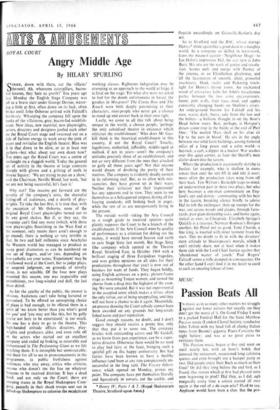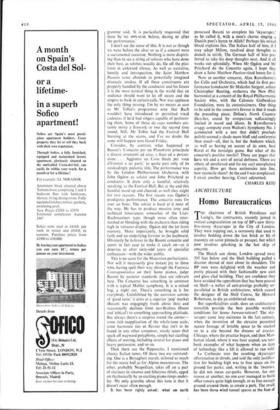MUSIC
Passion Beats All
IN music as in so many other matters we struggle against our lower natures but usually see they don't get the worst of it. On Good Friday I went to a packed Festival Hall for the Saint Matthew Passion music (London Choral Society, conductor John Tobin) with my head full of cheeky Italian tunes from Busoni's gigantic Piano Concerto the night before: and was at no great pains to extirpate them.
The Passion music began at five and went on until nearly ten, with an hour's break that jammed the restaurant, occasioned long cafeteria queues and even brought out a hamper party or two. Did people enjoy their Bach as much as their food? Or did they long before the end find, as I found, that metres which at first had pleased were now beginning to plod? Did they, as I did, sigh resignedly every time a soloist started all over again at the end of a da capo aria? Hard to say. Applause would have been a clue. But the pro- gramme said, 'It is particularly requested that there be NO APPLAUSE before, during or after the performance.'
I don't see the sense of this. It is not as though we were before the altar or as if a concert were a sacramental occasion. Nothing is more dispirit- ing than to see a string of soloists who have done their best, as soloists usually do, file off the plat- form in awkward silence. As well as narrative, homily and introspection, the Saint Matthew Passion score abounds in powerfully imagined dramatic strokes. If all these constituents are properly handled by the conductor and his forces it is the most natural thing in the world that an audience should want to let off steam and the singers to bask in curtain-calls. Nor was applause the only thing missing. I'm by no means as sure as Mr Tobin's programme note that Bach wouldn't have introduced or permitted vocal cadenzas if he'd had singers capable of perform- ing them. Some of those da capo numbers cer- tainly invite a firework or two the second time round. Still, Mr Tobin had the Festival Hall bursting at the seams, and I've no doubt the same will happen next Good Friday.
Consider, by contrast, what happened to Busoni's 'Concerto per un Pianoforte principale e diversi strumenti ad arco, a fiato ed a percus- sione . . . Aggiunto un Coro finale per voce d'Uomini a sei parti,' to quote part only of its misleadingly pedantic title. The performance was by the London Philharmonic Orchestra, with John Ogdon as soloist and John Pritchard as conductor. It drew only a handful, relatively speaking, to the Festival Hall. But at the end this handful stood up and cheered, as well they might for two reasons. The first reason was Ogdon's prodigious performance. The concerto runs for over an hour. The soloist is hard at it most of the way. He has to produce massive tone and technical luxuriances somewhat of the Liszt- Rachmaninov type, though more often inter- meshed or blending with the orchestra than riding high in virtuoso display. Ogdon did the lot from memory. More importantly, be brought solid faith and an underlying fervour to the keyboard. Obviously he believes in the Busoni concerto and seems in fair case to make it catch on—as it deserves to after sixty-odd years of specialist enthusiasm—with the wider public.
This is no score for the Mozartian perfectionist. Nor will it necessarily give instant joy to those who, having spelt their way through the Fantasia Contrapuntistica on their home pianos, judge Busoni by austerer standards than are relevant here. The Concerto has something in common with a typical Mahler symphony. It is a mixed bag, a night out. There's something in it for everybody. Uninhibited by the narrower canons of 'good taste,' it aims at a superior 'pop' market (Busoni was engagingly frank about this) and occasionally declines from neo-Brahms (fluent and 'ethical') to something approaching platitude. But always there's a surprise round the corner— some rich reapplication of the whole-tone scale, some harmonic tint or flavour that isn't to be found in any other composer, sturdy tunes that spark off wayward polyphony, simple but startling effects of scoring, including several for piano and heavy percussion; and so on.
Then there are the flippancies. I mentioned cheeky Italian tunes. Of these two are outstand- ing. One is a Bersaglieri march, tailored as much for the music hall as for Alpine manoeuvres. The other, probably Neapolitan, takes off on a pair of clarinets in sinuous and hilarious thirds, egged on rhythmically by an exciting piano-timps under- lay. My only grumble about this tune is that it doesn't recur often enough.
It has been righly asked : what on earth possessed Busoni to complete his 'skyscraper,' as be called it, with a men's chorus singing a Danish poet's hymn to Allah? Perhaps his mixed blood explains this. The Italian half of him, if I may adapt Milton, resolved deep thoughts to drench in mirth. The German half of him pre- ferred to take his deep thoughts neat. And it all works out splendidly. When Mr Ogdon and Mr Pritchard do the Concerto again, I hope they draw a Saint Matthew Passion-sized house for it.
Now to another concerto, Alan Rawsthorne's for Cello and Orchestra, which had its first per- formance (conductor Sir Malcolm Sargent, soloist Christopher Bunting, orchestra the New Phil- harmonia) at a concert of the Royal Philharmonic Society who, with the Calouste Gulbenkian Foundation, were its commissioners. One thing to be said in the concerto's favour is that it made the preceding piece, Delius's North Country Sketches, sound by comparison suffocatingly limited in mood and idiom. In Rawsthome's craggy company even Walton's Symphony No. 1 (conducted with a zest that didn't preclude polish) seemed a shade more bluff and conformist than usual—all, that is, but the Andante which, as well as having an accent of its own, beat Ravel at the nostalgia game. But what of the concerto's positive merits? There are pages that have wit and a sort of aerial deftness. There are others of unrelieved and (to my ear) unexplained asperity. How get these antinomies into line, how reconcile them? At the end I was nonplussed. I await another hearing. Court adjourned.
CHARLES REID



































 Previous page
Previous page